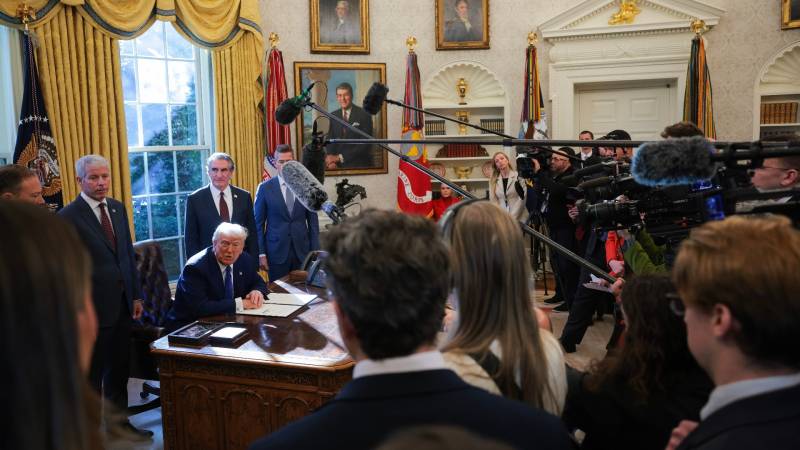The federal agency overseeing Voice of America has placed its chief national correspondent on a paid “excused absence” while it investigates his alleged bias against Donald Trump. The White House continues to bar the Associated Press from presidential events and maintains that it can handpick its press pool. Meanwhile, Washington Post owner Jeff Bezos — who donated $1 million to Trump’s inauguration fund — says the paper’s opinion section will now focus on free markets and personal liberties. The announcement led to the resignation of Post opinions editor David Shipley and triggered over 75,000 digital subscription cancellations. We look at the Trump Administration’s moves to muzzle the press and their potential impact.
How is the Media Changing Under President Trump?

Guests:
David Folkenflik, media correspondent, NPR News
Ann Telnaes, Pulitzer-prize winning editorial cartoonist, formerly with The Washington Post; writer, the Substack “Open Windows”
Show Highlights
Trump Administration’s Attacks on Press Freedom
The Trump administration has taken action against press freedom, targeting critical voices and restricting access to news organizations that do not conform to its preferred narratives.
Voice of America’s chief national correspondent, Steve Herman, was placed on paid leave after being accused of displaying anti-Trump bias on social media. The White House has barred the Associated Press from presidential events for refusing to adopt the administration’s preferred terminology, such as referring to the Gulf of Mexico as the “Gulf of America.”
Meanwhile, the Federal Communications Commission (FCC), under Chair Brendan Carr, has reopened investigations into major broadcasters—including ABC, CBS, NBC, NPR, and PBS—while notably exempting the Trump-aligned Fox News.
Efforts to Restrict Public Information and Funding
Beyond targeting specific media outlets, the administration has also sought to restrict public access to federally gathered research and data.
NPR Media Correspondent David Folkenflik says: “There’s a desire to constrict information flow that he [Trump] doesn’t control, so that information he doesn’t want out there—information that might contradict his aims—is not available for people to fact-check him with.”
The administration has also proposed eliminating all public funding for NPR and PBS while scrutinizing their corporate underwriting as “commercials.”
NPR reporters have been barred from Pentagon workspaces, further restricting access to government information.
How News Organizations Are Responding
Some news outlets have adjusted their editorial approaches, seemingly to avoid conflict with the administration. Washington Post owner Jeff Bezos announced a new editorial focus on “free markets and personal liberties,” leading to the resignation of opinions editor David Shipley and over 75,000 digital subscription cancellations.
Despite these pressures, investigative journalism remains strong. Folkenflik says that “reporting at The Washington Post has actually been pretty muscular and impressive.”
However, the shift in editorial stance has pushed some journalists out. Former Washington Post editorial cartoonist Ann Telnaes resigned after one of her anti-Trump cartoons was censored, feeling she could no longer do her job freely.
Organizations like the Associated Press are fighting back through legal action to regain access to government briefings.
Chilling Effects and Self-Censorship
The administration’s tactics have created a climate of fear, causing both journalists and private citizens to self-censor.
One caller, Max from Oakland, shares that he stopped creating anti-Trump digital collages out of fear that AI surveillance could track and target him.
Folkenflik cautions against exaggerating the situation, saying that the U.S. has not reached the point of “rounding people up.” But he acknowledges the growing anxiety and warns that hyperbole can desensitize people to real, tangible threats.
Why Independent Journalism Matters
Both guests and listeners emphasize the critical role independent journalism plays in preserving democratic accountability.
A caller named Bert, who previously worked in the Reagan administration’s press office, highlights the need for an adversarial press corps that holds those in power accountable. He points out the absence of figures like Sam Donaldson, who once rigorously challenged presidents, and says that today’s press should call out Trump’s falsehoods directly rather than using vague phrases like “not providing facts.”
Folkenflik urges audiences to support credible news sources that engage in original, fact-based reporting and acknowledge their mistakes.
This content was edited by the Forum production team but was generated with the help of AI.